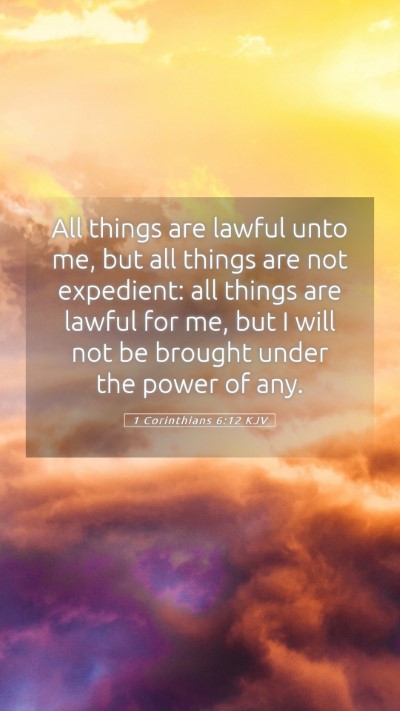Understanding 1 Corinthians 6:12: A Comprehensive Bible Verse Explanation
The verse 1 Corinthians 6:12 states: "All things are lawful unto me, but all things are not expedient: all things are lawful for me, but I will not be brought under the power of any." This passage offers profound insights into the nature of Christian freedom, the limits of liberty, and the importance of self-control in the life of a believer. Below, we will explore its meanings through combined insights from public domain commentaries, enhancing your understanding of this scripture.
Contextual Background of the Verse
The Apostle Paul wrote this letter to the Corinthian church to address various issues they were facing, including immorality, division, and misunderstandings about Christian liberty. The church had adopted a perspective on freedom that led some to justify sinful behaviors under the claim of liberty. Paul’s objective was to clarify that while believers have freedom in Christ, this freedom must be exercised with wisdom and responsibility.
Key Themes in 1 Corinthians 6:12
- Christian Liberty: The phrase "all things are lawful" indicates the broad freedom Christians possess. However, Paul quickly adds a caveat—while all things are permissible, not all are beneficial or expedient.
- Self-Control: The latter part of the verse highlights the need for self-restraint, emphasizing that freedom should not lead to bondage or uncontrolled behavior.
- Spiritual Maturity: Understanding and applying this verse requires spiritual discernment, as believers must evaluate their choices carefully rather than relying solely on the concept of liberty.
Bible Verse Meanings from Public Domain Commentaries
Matthew Henry's Commentary
Matthew Henry emphasizes that while the Christian is free from the law as a means of justification, this freedom does not grant permission to indulge in sin. He states that true liberty is accompanied by restraint and that one must not permit themselves to be dominated by anything, even if that something appears harmless or permissible.
Albert Barnes' Commentary
Albert Barnes notes that Paul's argument revolves around the potential misuse of liberty. He points out that though one might claim to have the right to do anything, it does not necessarily mean that every action is beneficial or wise. Barnes warns about the dangers of allowing permissible things to lead one away from spiritual health and maturity.
Adam Clarke's Commentary
Adam Clarke highlights the phrase "I will not be brought under the power of any" as a declaration of faith. He interprets this as a call to resist the influence of desires or practices that could ensnare believers, thereby invoking a reminder that freedom should ultimately lead to greater devotion to God rather than lesser engagement with sin.
Application of 1 Corinthians 6:12
When applying the teachings of this verse, believers are encouraged to consider the following:
- Evaluate Actions: Each action should be considered for its consequences, asking whether it leads to personal or communal edification.
- Practice Self-Control: Engage in disciplines that cultivate self-control, ensuring that one's freedom in Christ does not descend into licentiousness.
- Seek Wisdom: Engage in prayer and meditation on Scripture to gain discernment, recognizing that liberty must be balanced with wisdom.
Cross References Related to 1 Corinthians 6:12
- Galatians 5:13 - "For, brethren, ye have been called unto liberty; only use not liberty for an occasion to the flesh, but by love serve one another."
- 1 Peter 2:16 - "As free, and not using your liberty for a cloak of maliciousness, but as the servants of God."
- Romans 6:1-2 - "What shall we say then? Shall we continue in sin, that grace may abound? God forbid."
Conclusion
In summary, 1 Corinthians 6:12 provides a foundational understanding of Christian liberty, emphasizing that while believers are free in Christ, they must exercise that freedom with wisdom, self-control, and a keen awareness of their spiritual health. Through careful consideration of the insights provided by Matthew Henry, Albert Barnes, and Adam Clarke, one gains a richer understanding of what it means to live as a follower of Christ in regards to freedom and responsibility.
For Bible study groups and individual study, this verse serves not only as an important theological statement but also as a practical guideline for daily life, prompting reflection and dialogue about how to effectively apply Scripture teachings in a modern context.


